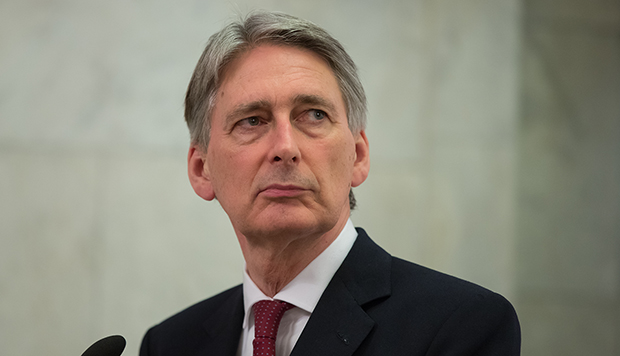The decision by the Chancellor to curb letting agent fees has come in for some harsh criticism from landlords and agents, with the costs likely to be passed on to tenants. Chancellor Philip Hammond said in his first Autumn Statement that letting agent fees would be banned after spiralling to hundreds of pounds. The move […]
 The decision by the Chancellor to curb letting agent fees has come in for some harsh criticism from landlords and agents, with the costs likely to be passed on to tenants.
The decision by the Chancellor to curb letting agent fees has come in for some harsh criticism from landlords and agents, with the costs likely to be passed on to tenants.
Chancellor Philip Hammond said in his first Autumn Statement that letting agent fees would be banned after spiralling to hundreds of pounds.
The move aims to help 4.3 million households currently in rented accommodation who are hit with an average of £337 in charges on top of what they pay in rent.
David Cox, the head of the Association of Residential Letting Agents, branded it a “draconian measure” that could see landlords hike rents to recoup losses.
“A ban on letting agent fees is a draconian measure, and will have a profoundly negative impact on the rental market. It will be the fourth assault on the sector in just over a year, and do little to help cash poor renters save enough to get on the housing ladder,” said Cox.
“This decision is a crowd-pleaser, which will not help renters in the long-term. All of the implications need to be taken into account.”
haart estate agents estimates that on average rents will increase by £255 a year – with tenants in London likely to be much worse off.
Paul Smith, CEO of haart estate agents, agreed, saying the ban was another “unwelcome and haphazard” government intervention in the rental market.
He said: “The cost of administration such as references and inventories that tenant fees would have previously covered are now likely to be passed onto the tenant through their rent.
“We’re creating a time bomb for Generation Rent by pushing landlords out of the market, as well as undermining housebuilders’ pipelines by cutting demand.”
Matthew Daines, co-founder of lettingaproperty.com, pointed out that landlords would look to use cheaper agents rather than increase fees.
He said: “Lets’ face it, many high street agents have profited hugely in the past by charging tenants inflated tenancy fees.
“With this change and the landlord knowing that they are having to cover these expenses, more will shop around.
“Landlords who shop around and use reputable agents with lower fees will have the flexibility to compete with lower rental prices against those being listed by the high street agents that incorporate these fees.”
Scotland
According to figures from Shelter, the removal of letting fees in Scotland did not cause any spike in rents. The ONS index shows that private rents have inflated by 5% in Scotland since the law on fees was clarified in November 2012, and in England rents have risen by 9% over this period.
Stephen Smith, director of Legal & General housing partnerships, said: “Contrary to initial speculation, the implementation of this policy in Scotland in 2012 does not seem to have had a negative impact either on rents or on the availability of private rented accommodation.
“We therefore hope the roll out in England and Wales will be as successful. Across the UK, the private rental sector is a hugely important housing tenure that provides homes for hundreds of thousands of people from all walks of life. This decision will help to give power back to these tenants and remove some of the financial sting of renting.”
Jeremy Leaf, north London estate agent and a former RICS residential chairman, said: “The problem with fees charged by letting agents to tenants is that landlords have a choice as to which agent they use whereas tenants generally don’t.
“Landlords can go to another agent so the agents will have to absorb the cost and get it from somewhere else. This is why Foxtons’ share price plummeted because agents like them who add a lot to the tenant’s cost of renting, will suffer. The trouble is there are a few rogue agents who have been overcharging and as a result all agents will lose out financially as a result.”
So what is the problem with letting fees?
Lots of renters complain they are hit with extortionate fees from letting agents for unnecessary administration costs.
They often include costs such as processing documents, bank transactions or credit checks and many tenants find themselves being hit with them at the last minute.
Fees are usually higher in cities than anywhere else and many tenants often find themselves getting into debt to pay them.
Betsy Dillner, director of Generation Rent, said: “The case against letting fees has become unanswerable, so it is fantastic news that the government has decided to ban them. Tenants are a captive market for letting agents who can charge fees that bear no relation to the true cost of their service. Some agents are getting away with charging a couple more than £700 at the start of a tenancy.
“These costs are making it impossible for some tenants to move out of unsuitable homes. By removing this market barrier, the government will force negligent landlords to up their game.
“The letting agent’s costs should be paid by their customer anyway – the landlord. With more choice over who they use than tenants have, landlords would be more able to force down excessive costs.”
The decision to cut letting agent fees will be particularly galling for landlords who have already been hit with a raft of regulations by the government.
In April this year the government increased stamp duty for landlords and second home owners by 3%.
From April next year there will also be a limit on mortgage interest relief for residential buy-to-let properties to the base income tax rate, which is 20%. This is due to be phased in over a four-year period starting from April 2017. Landlords are currently able to claim tax relief on the top rate of tax of up to 45%.
Many buy-to-let investors are now considering leaving the sector as they fear letting out a property will become far less profitable when the reforms come into force in April 2017.














